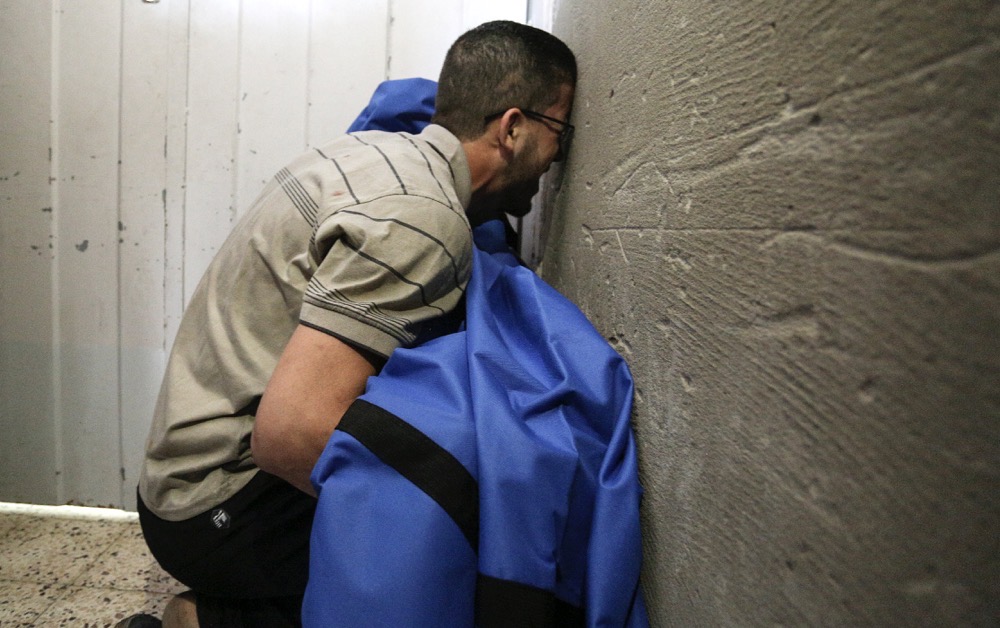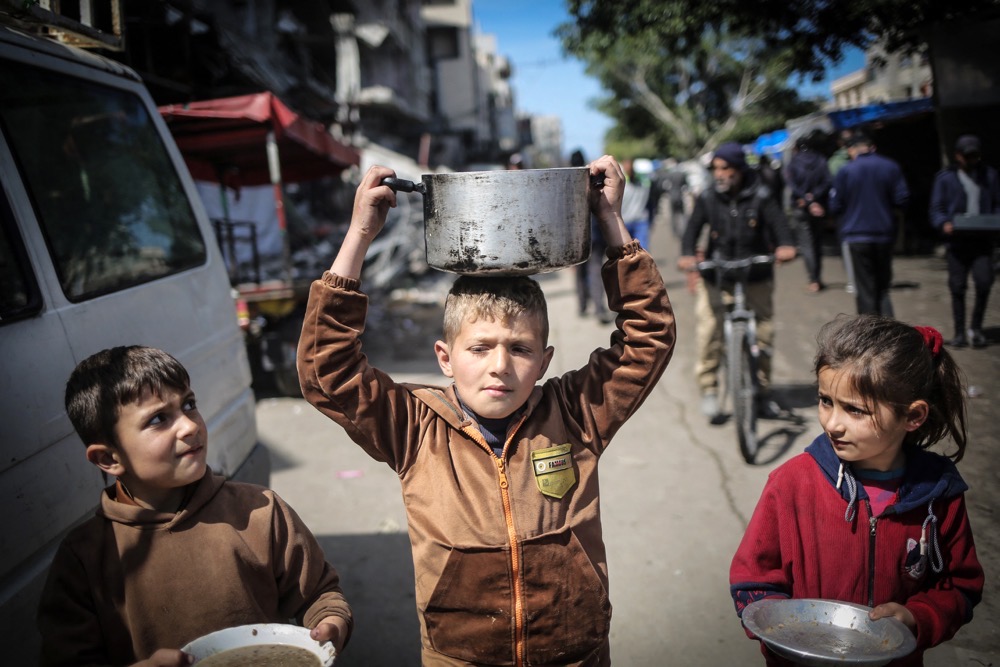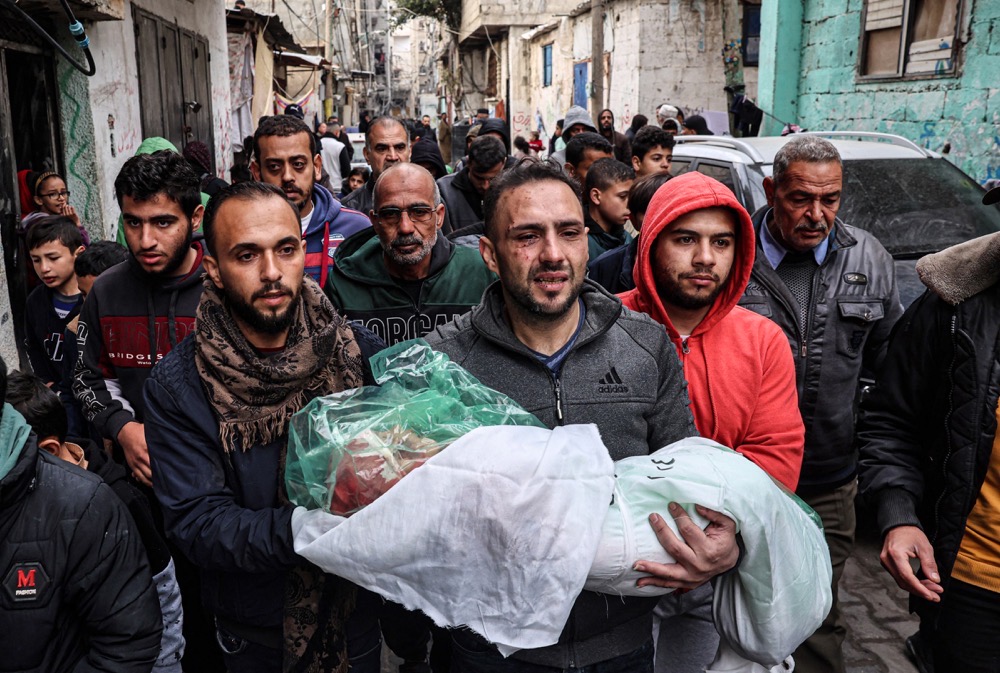LONDON: Ahmed’s plans for his eagerly anticipated first child were shattered when the Israeli military bombed his home in Sabra, in western Gaza, on Oct. 26 last year.
In his telling, among the possessions destroyed in the attack was a nursery that he and his wife had lovingly decorated.
“All the preparations we made to ensure our first baby arrives in a beautiful world have been completely overturned,” Ahmed, 28, an expectant Palestinian father now displaced to Rafah in southern Gaza, told Arab News.
“The onslaught has shattered our dreams for our baby girl. The nursery, our home, and the family house have all been turned to rubble.”

The Israeli government says its military does not target civilians or hospitals. (AFP)
Since the Hamas-led attack of Oct. 7 that triggered Israel’s continued military offensive in Gaza, countless images from the embattled enclave have shown fathers carrying their wounded children, cradling their lifeless bodies, and pleading for help for their starving families.
One video that caught the world’s attention in November showed a Palestinian father holding his lifeless daughter in his arms, reminiscing about her life, and calling her in Arabic “the soul of my soul,” which conveys profound love and affection.
Expected to protect and provide for their families, fathers in Gaza are shouldering “an immense weight of responsibility,” Jeeda Alhakim, a specialist counseling psychologist at City, University of London, told Arab News.
These fathers “may want to try to shield their children from the harsh realities of the war,” said Alhakim, but “it is very difficult in Gaza to do so because there is no sense of safety for anyone at this stage.”
At the same time, fathers in Gaza are “struggling with trauma themselves and may be grieving in the same way that their children would be.”
Often the primary breadwinner in Palestinian households, fathers are frequently under “a lot of strain” if they are unable to provide for their families.
“This may also evoke a range of different feelings, such as anger, irritability, low sense of self or low moods, as well as anxiety and stress.”
Many fathers, concerned about their children’s future “may also feel guilt, as they are unable to protect their children,” Alhakim added.

Fathers in Gaza “may experience feelings of helplessness and powerlessness as they strive to protect and provide for their families and their children but find themselves unable to do so,” Jeeda Alhakim said. (AFP)
At least 13,000 Palestinian children have been killed since the conflict began, according to UNICEF, the UN children’s agency.
With famine looming due to the prolonged siege, the destruction of infrastructure, and aid failing to reach families in northern Gaza, fathers in some areas have resorted to scavenging rotten vegetables, leaves, and even animal feed to alleviate their children’s hunger.
On Monday, the EU’s top diplomat, Josep Borrell, accused Israel of using starvation as a weapon of war in Gaza. Speaking at a conference in Brussels, he said the enclave was now “in a state of famine, affecting thousands of people.”
Under these circumstances, fathers in Gaza “may experience feelings of helplessness and powerlessness as they strive to protect and provide for their families and their children but find themselves unable to do so,” said Alhakim.
Earlier this month, one father in Gaza encapsulated the desperation of many Palestinian families in an interview with BBC Arabic’s Gaza Lifeline radio service after his baby son, Ali, died of malnutrition and dehydration.
“Ali was born in wartime and there was no food or anything for his mother to eat — a matter which caused his kidneys to fail,” he told the BBC.

At least 13,000 Palestinian children have been killed since the conflict began, according to UNICEF. (AFP)
The UN Relief and Works Agency for Palestine Refugees in the Near East, UNRWA, warned on Saturday that one in three children under the age of two in Gaza is acutely malnourished.
This extremely vulnerable group includes the more than 20,000 babies born in Gaza since the start of the war, according to UNICEF.
The trauma familiar to these young families has perhaps been more keenly felt by those who had struggled to become pregnant before the conflict. What should have been a happy miracle has instead turned into a terrifying responsibility.
Ahmed said he and his wife underwent several medical tests after two years of trying for a child. They were told exposure to toxic fumes from a past Israeli bombing incident had affected Ahmed’s fertility.
INNUMBERS
• 20k+ Babies born in Gaza since the outbreak of war.
• 13k+ Children killed in Gaza since Oct. 7.
• 1/3 Children under age 2 deemed malnourished.
After undergoing treatment for several months, the couple finally managed to conceive. “I was overcome with joy when my wife told me she was pregnant,” said Ahmed.
“Before the hostilities, my wife was in her second trimester, and so we were decorating the baby’s room in our home and buying baby clothes. All of that is gone, and we can’t replace the lost baby clothes because these are no longer available in Gaza’s markets. Diapers and baby formula are also very hard to find and come at exorbitant prices.”
Ahmad and his wife have also lost the doctor who was scheduled to deliver their daughter.

Many fathers, concerned about their children’s future “may also feel guilt, as they are unable to protect their children,” Jeeda Alhakim said. (AFP)
“Even the doctor who was supposed to deliver our baby is no longer here — she managed to flee because, I think, she has a Russian passport,” said Ahmad. “There is no adequate hospital for my wife to have our baby.”
The World Health Organization says only 30 percent of Gaza’s medics are still working.
Meanwhile, just nine of Gaza’s 36 health facilities are still functioning, most only partially, and all at many times their intended capacity after months under intense bombardment and supply shortages.
The Israeli government says its military does not target civilians or hospitals, and blames Hamas for conducting military operations and launching rockets from crowded residential areas.
Ahmed said he is deeply concerned for his wife’s well-being in displacement. “The living conditions are particularly harsh for pregnant women,” he said. “There is no food or drinking water.”
At least 60,000 pregnant women in Gaza suffer from malnutrition, dehydration, and a lack of access to healthcare, according to Gaza’s health ministry.

Since Oct.7, countless images from Gaza have shown fathers carrying their wounded children, cradling their lifeless bodies, and pleading for help for their starving families. (AFP)
Earlier this month, the ministry said about 5,000 women are going into labor each month amid “harsh, unsafe and unhealthy conditions as a result of bombardment and displacement.”
Many have undergone C-sections without any anesthetic, pain relief, sterilization, or antibiotics. Babies are often born on floors and into tin baths filled with warm water.
New parents bringing life into the world amid these extreme conditions suffer “a loss of potential identity and purpose,” said Alhakim.
“If they have a sense of identity that’s attached to parenthood or to being a father, or if they find purpose in taking care of their children — then the war in Gaza has stripped them of this.”






























